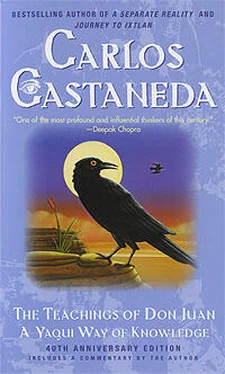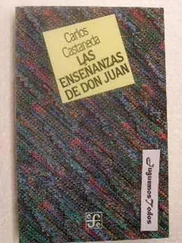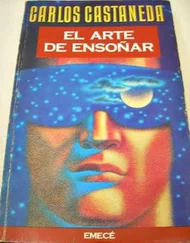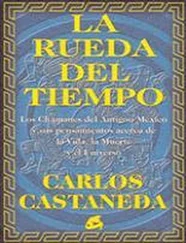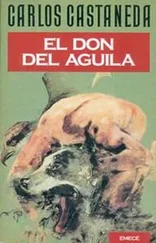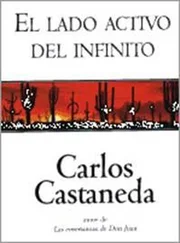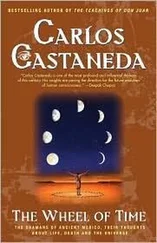The first theme had three components: (1) there were no overt requirements for becoming a man of knowledge; (2) there were some covert requirements; (3) the decision as to who could learn to become a man of knowledge was made by an impersonal power.
Apparently there were no overt prerequisites that would have determined who was, or who was not, qualified to learn how to become a man of knowledge. Ideally, the task was open to anybody who wished to pursue it. Yet, in practice, such a stand was inconsistent with the fact that don Juan as a teacher selected his apprentices.
In fact, any teacher under the circumstances would have selected his apprentices by means of matching them against some covert prerequisites. The specific nature of these prerequisites was never formalized; don Juan only insinuated that there were certain clues one had to bear in mind when viewing a prospective apprentice. The clues he alluded to were supposed to reveal whether or not the candidate had a certain disposition of character, which don Juan called 'unbending intent'.
Nevertheless, the final decision in matters of who could learn to become a man of knowledge was left to an impersonal power that was known to don Juan, but was outside his sphere of volition. The impersonal power was credited with pointing out the right person by allowing him to perform a deed of extraordinary nature, or by creating a set of peculiar circumstances around that person. Hence, there was never a conflict between the absence of overt prerequisites and the existence of undisclosed, covert prerequisites.
The man who was singled out in that manner became the apprentice. Don Juan called him the escogido, the 'one who was chosen'. But to be an escogido meant more than to be a mere apprentice. An escogido, by the sheer act of being selected by a power, was considered already to be different from ordinary men. He was considered already to be the recipient of a minimum amount of power which was supposed to be augmented by learning.
But learning was a process of unending quest, and the power that made the original decision, or a similar power, was expected to make similar decisions on the issue of whether an escogido could continue learning or whether he had been defeated. Those decisions were manifested through omens that occurred at any point of the teachings. In that respect, any peculiar circumstances surrounding an apprentice were considered to be such omens.
A man of knowledge had unbending intent
The idea that a man of knowledge needed unbending intent referred to the exercise of volition. Having unbending intent meant having the will to execute a necessary procedure by maintaining oneself at all times rigidly within the boundaries of the knowledge being taught. A man of knowledge needed a rigid will in order to endure the obligatory quality that every act possessed when it was performed in the context of his knowledge.
The obligatory quality of all the acts performed in such a context, and their being inflexible and predetermined, were no doubt unpleasant to any man, for which reason a modicum of unbending intent was sought as the only covert requirement needed by a prospective apprentice.
Unbending intent was composed of (1) frugality, (2) soundness of judgement, and (3) lack of freedom to innovate.
A man of knowledge needed frugality because the majority of the obligatory acts dealt with instances or with elements that were either outside the boundaries of ordinary everyday life, or were not customary in ordinary activity, and the man who had to act in accordance with them needed an extraordinary effort every time he took action. It was implicit that one could have been capable of such an extraordinary effort only by being frugal with any other activity that did not deal directly with such predetermined actions.
Since all acts were predetermined and obligatory, a man of knowledge needed soundness of judgement. This concept did not imply common sense, but did imply the capacity to assess the circumstances surrounding any need to act. A guide for such an assessment was provided by bringing together, as rationales, all the parts of the teachings which were at one's command at the given moment in which any action had to be carried out. Thus, the guide was always changing as more parts were learned; yet it always implied the conviction that any obligatory act one may have had to perform was, in fact, the most appropriate under the circumstances.
Because all acts were pre-established and compulsory, having to carry them out meant lack of freedom to innovate. Don Juan's system of imparting knowledge was so well established that there was no possibility of altering it in any way.
A man of knowledge had clarity of mind
Clarity of mind was the theme that provided a sense of direction. The fact that all acts were predetermined meant that one's orientation within the knowledge being taught was equally predetermined; as a consequence, clarity of mind supplied only a sense of direction. It reaffirmed continuously the validity of the course being taken through the component ideas of (1) freedom to seek a path, (2) knowledge of the specific purpose, and (3) being fluid.
It was believed that one had freedom to seek a path. Having the freedom to choose was not incongruous with the lack of freedom to innovate; these two ideas were not in opposition nor did they interfere with each other. Freedom to seek a path referred to the liberty to choose among different possibilities of action which were equally effective and usable. The criterion for choosing was the advantage of one possibility over others, based on one's preference. As a matter of fact, the freedom to choose a path imparted a sense of direction through the expression of personal inclinations.
Another way to create a sense of direction was through the idea that there was a specific purpose for every action performed in the context of the knowledge being taught. Therefore, a man of knowledge needed clarity of mind in order to match his own specific reasons for acting with the specific purpose of every action. The knowledge of the specific purpose of every action was the guide he used to judge the circumstances surrounding any need to act.
Another facet of clarity of mind was the idea that a man of knowledge, in order to reinforce the performance of his obligatory actions, needed to assemble all the resources that the teach— ings had placed at his command. This was the idea of being fluid. It created a sense of direction by giving one the feeling of being malleable and resourceful. The compulsory quality of all acts would have imbued one with a sense of stiffness or sterility had it not been for the idea that a man of knowledge needed to be fluid.
To become a man of knowledge was a matter of strenuous labour
A man of knowledge had to possess or had to develop in the course of his training an all-around capacity for exertion. Don Juan stated that to become a man of knowledge was a matter of strenuous labour. Strenuous labour denoted a capacity (1) to put forth dramatic exertion; (2) to achieve efficacy; and (3) to meet challenge.
In the path of a man of knowledge drama was undoubtedly the outstanding single issue, and a special type of exertion was needed for responding to circumstances that required dramatic exploitation; that is to say, a man of knowledge needed dramatic exertion. Taking don Juan's behaviour as an example, at first glance it may have seemed that his dramatic exertion was only his own idiosyncratic preference for histrionics. Yet his dramatic exertion was always much more than acting; it was rather a profound state of belief. He imparted through dramatic exertion the peculiar quality of finality to all the acts he performed. As a consequence, then, his acts were set on a stage in which death was one of the main protagonists. It was implicit that death was a real possibility in the course of learning because of the inherently dangerous nature of the items with which a man of knowledge dealt; then, it was logical that the dramatic exertion created by the conviction that death was a ubiquitous player was more than histrionics.
Читать дальше
